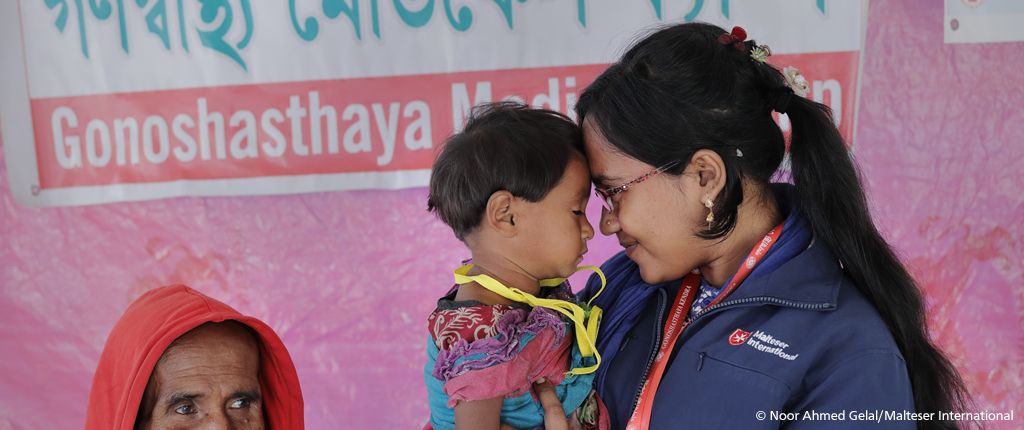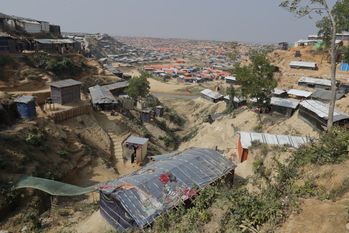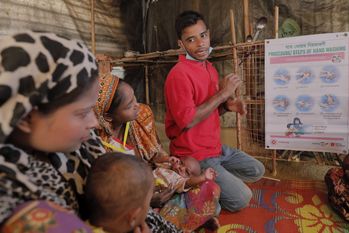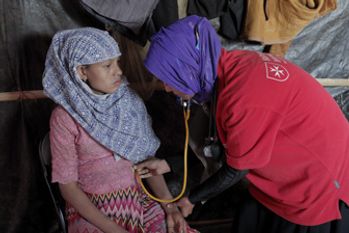
Better health conditions and emergency relief for refugees and local populations in Cox's Bazar
In order to improve conditions for people in the overcrowded refugee camps, we have been on the ground since the beginning of the crisis, providing vital assistance in the areas of health, water, hygiene and nutrition.
Our project aims to continue the comprehensive primary health care system that has been established in recent years with our partner Gonoshasthaya Kendra (GK). This system is designed to meet the needs of the Rohingya refugee population and the surrounding Bangladeshi host communities in Cox's Bazar district. Special attention is given to women, children and other disadvantaged groups.
We provide basic medical services and psychosocial counseling at three health facilities within the camps. Additionally, we support five community clinics in Kutubdia, one of the most vulnerable areas for the health care of host communities.
We are also improving the disaster preparedness and response capacities by developing emergency plans and training employees and partner organizations. This ensures that humanitarian aid can be provided as quickly as possible in the event of a disaster, such as the annual floods. Additionally, we prioritize supporting our local partners by continuously strengthening their capacities in quality and accountability, empowering them to deliver impactful project work.
This project is being implemented under a joint grant from the German Federal Foreign Office with similar components in nearby northern Rakhine State in Myanmar.
Following the outbreak of violence in August 2017, the number of refugees from Myanmar in Cox's Bazar district, located in the south of the country, rose to approximately 900,000 people within a few months. The majority of the members of the Rohingya ethnic group reached Bangladesh completely traumatized and in poor health. The refugees settled in fields and along roads in Cox's Bazar, where they hoped for help. Within a short time, refugee camps were set up in the district by the Bangladeshi government and the United Nations. Years later, the situation in the camps, which together form the largest refugee camp in the world, is still dramatic: the hygienic conditions are catastrophic. In the cramped conditions and heat, diseases can spread uncontrollably, especially during the rainy season. There is a lack of adequate water supply, food, proper housing and sanitation, access to health care, schools, and much more.
Our goal is to improve the health and well-being of vulnerable, crisis-affected people, especially mothers, young children, and the elderly, in the camps and surrounding communities in Cox's Bazar through holistic health care and timely emergency response.
- Provision of primary health care services with a focus on maternal and child health at three health centers in the camps, as well as in host communities in Kutubdia and Cox's Bazar
- Referral of emergency cases to the nearest hospital
- Psychosocial support in individual or group sessions at the health centers
- Health and hygiene education activities in the health center areas
- Identification and monitoring of the nutritional status of pregnant women, lactating mothers, children between six to 59 months, people with disabilities and the elderly
- Awareness and education activities for mothers and children about health, nutrition, and hygiene
- Referring emergency cases to the nearest care center for malnourished/undernourished women and children
- Developing and implementing emergency and disaster preparedness plans at health posts
- Provision of an emergency fund to respond as quickly as possible in the event of another disaster
- Strengthen administrative, technical, and management capacity of local partner organization GK to ensure quality and accountability
Country info
Capital: Dhaka
Area: 147.570 km²
Population: approx. 174 million
Project data
Project duration: since August 2017
Financing: German Federal Foreign Office, The German Relief Coalition (Aktion Deutschland Hilft - ADH)
Partner: Gonoshasthaya Kendra (GK)











